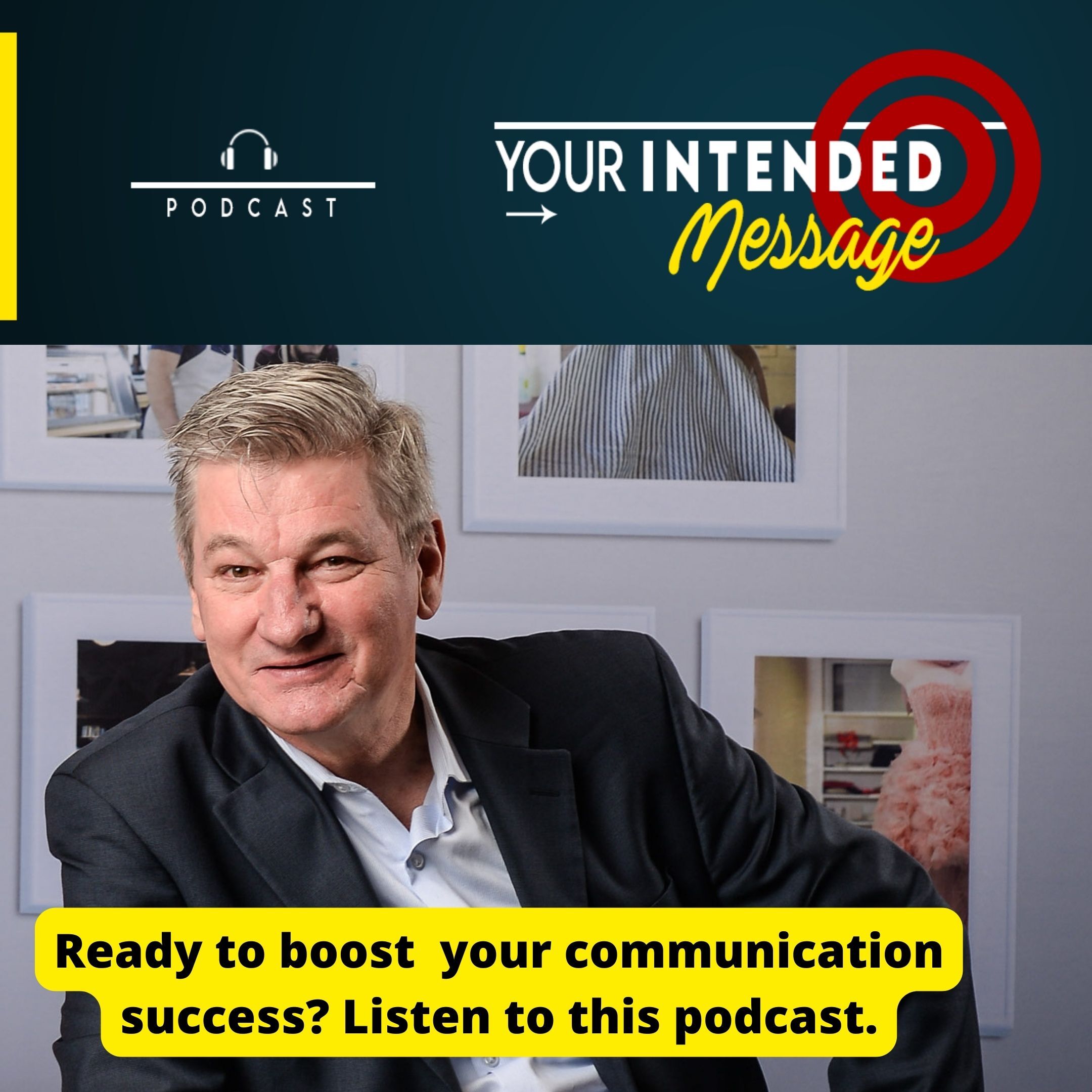
17.5K
Downloads
292
Episodes
The podcast about Effective Communication in Business
Better communication skills will advance your career and business. Are you ready to enhance your understanding and results from better communication? Listen and learn how to deliver Your Intended Message.
Are you willing to cross-examine communication from various perspectives? Would you like to deliver your intended message more effectively?
Listen to Your Intended Message to gain a powerful advantage in your ability to convey your message to your audience, team, clients or marketplace.
Learn from the mistakes and success of communication experts from around the world from different scenarios.
The better communicator has the competitive advantage.
Imagine what that means to you when you improve the success of your next conversation, presentation or message.
Your Host - George Torok
https://yourintendedmessage.com/
The podcast about Effective Communication in Business
Better communication skills will advance your career and business. Are you ready to enhance your understanding and results from better communication? Listen and learn how to deliver Your Intended Message.
Are you willing to cross-examine communication from various perspectives? Would you like to deliver your intended message more effectively?
Listen to Your Intended Message to gain a powerful advantage in your ability to convey your message to your audience, team, clients or marketplace.
Learn from the mistakes and success of communication experts from around the world from different scenarios.
The better communicator has the competitive advantage.
Imagine what that means to you when you improve the success of your next conversation, presentation or message.
Your Host - George Torok
Episodes
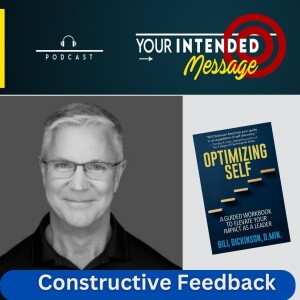
Thursday Sep 12, 2024
Give and Receive Constructive Feedback : Bill Dickinson
Thursday Sep 12, 2024
Thursday Sep 12, 2024
How to encourage the exchange of feedback
The Power of Empathy as a Leadership Quality
Episode 223 (Bill is based in Atlanta, Georgia)
In this conversation with Bill Dickinson we explored:
- The value of empathy for a leader
- Understanding the complicated makeup of your people
- Distinguishing empathy from sympathy
- Avoiding the role of confessor or councilor
- Setting guidelines and boundaries
- Creating psychological safety
- How to provide regular constructive feedback
- The 90-day introductory trial period
----
About our guest, Bill Dickinson:
Bill has nearly three decades of experience in designing and delivering leadership development programs across industries including, Boeing, Coca-Cola and AbbeVie Biopharmaceutical. He was a Catholic priest for 25 years.
He is on The Harvard Business Review's Advisory Council.
He is the author of "Optimizing Self: A Guided Workbook to Elevate Your Impact as a Leader"
Learn more about his services here https://www.c3leadership.org/
You can find his book on Amazon Optimizing Leadership
-----
Excerpts from this conversation with Bill Dickinson:
I think some of the mistakes that leaders can make is they confuse empathy with sympathy. Sympathy is, is simply feeling sorry for someone where empathy is is, I'm not just sorry about what happened to your state or this moment, but I want to understand it.
I want to support you through it. And those are, you know, those are two big differences. So an empathy now gives us the space, the term to understand we can hang with our people in their feelings without creating dependency.
-----
I need two things specifically that I did well, and I need you to share with me two things I could do differently.
-----
There's a model called the SBI model, what's the situation? What was the behavior I observed in the situation, and what was the impact of that behavior?
So the situation is, George, you and I are having a thoughtful conversation on feedback in this podcast, the behavior that I observe is a host who is thoughtful and knowledgeable about leadership and their respect for me in it.
So the impact that has on me is that I want to hang with you. I want to make you look good, and I want to contribute to the quality of this podcast so your listeners walk away with some new learning,
-----
Read the rest of this entry »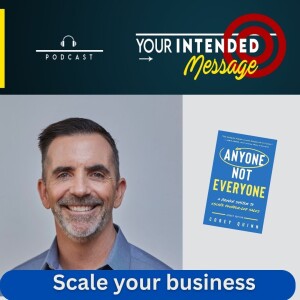
Thursday Aug 29, 2024
How to Specialize and Expand your Markets: Corey Quinn
Thursday Aug 29, 2024
Thursday Aug 29, 2024
How to accelerate growth by scaling your process
How to escape founder-led sales
Episode 222 (Corey is based in Los Angeles)
In this conversation with Corey Quinn we explore:
- Knowing the market better than the market specialists
- Caring about the clients
- How to warm up a cold call
- How to transfer your process to another vertical market
- How to leverage empathy
- Defining your business by the industry of your clients
- Leveraging the power of repeatable systems
- How to specialize in more than one niche
-----
About our guest, Corey Quinn:
As Chief Marketing Officer of Scorpion, he helped them grow from $20M to $150M in 6 years.
He's worked 17 years in the marketing agency business.
He's the author of "Anyone, Not Everyone".
You can get a free copy of the audio book here:
-----
Excerpts from this conversation with Corey Quinn:
You need to have repeatable sales process that is not dependent on the on the founder, so you have to strip out all of the variables from the sales process, make it much more operationally or streamlined.
-----
The impact of empathy happens before the cold call.
What I'm a big fan of is interviewing your clients and understanding how and why they buy from you, so you understand the attributes that they're looking for. That's one piece.
The other piece is when I coach my clients, but I do I do this work with with agencies, what I encourage them to do is to think of themselves, not as a in the digital marketing industry, I want them to think of themselves. In their clients industry.
So if you're serving med spas, you are no longer in the business or in the industry of digital marketing. Now you are a member of the med spa industry, and as a result of that, you're going to their conferences. You're joining the associations. You're participating in the associations. You know what's happening in the industry, and you're helping to further the interests of that interest industry, I'll give you an example.
At Scorpion, we worked in the franchise, franchise, multi location business industry is, interestingly, a lot of it's a big segment of our economy, but it's a relatively small industry.
What we did to enter into that world is we became a part of that industry. What I mean by that is our leaders, who focused on franchise they became certified as something that's called the CFE CERTIFIED FINANCIAL executive. That is an 18 month program to become certified in that we also joined a group called the IFA, which is the International Franchise Association.
-----
Read the rest of this entry »
Friday Aug 23, 2024
Marketing perspective from a person with Tourette's: Kristof Morrow
Friday Aug 23, 2024
Friday Aug 23, 2024
Is there enough Human Spirit in your Marketing?
Episode 221 (Kristof is based in South Carolina)
In this conversation with Kristof Morrow we explore:
- The honest perspective from a person with Tourette's Syndrome
- The value of revealing a flaw
- Talking about internal conflicts
- Indirect marketing versus direct marketing
- Memorable characters from Super Bowl ads
- Understanding the audience that likes and follows you
- Recognizing the perspective of the audience, their bias and ignorance
- How to show kindness in your marketing
- Being transparent about your deficiencies
-----
About our guest, Kristof Morrow:
Kristof is an award wining journalist and the author of two books in the fantasy series, The Second Sun. He is a disabled veteran. He has Tourette's Syndrome which offers him a unique perspective on marketing and communication. His mission is to help people better understand each other.
You can learn more about Kristof and his book, at the website: https://www.kristofmorrow.com/
-----
Excerpts from this conversation with Kristof Morrow:
Respect is a large part of marketing.
-----
For example, you you just said "Shakespeare" when we weren't even talking about Shakespeare.
And Christophe also has Tourette's Syndrome, which means, and as most people might understand it, that people have tics. They often say things involuntary.
Sometimes they might even have physical tics, I'm guessing. And let's see how that gives Kristoff a particular perspective that most of us can't see. And today we're going to talk about the spirit of marketing.
And that's an interesting phrase that you used Kristoff. Tell us what that means to you.
I think that means ultimately, like, how, how much of yourself, how human your approach to marketing is, how much you deviate from the notion that there has to be sort of a calculated approach. It's very it's a lot more human, I think. Yeah, so, for example, like I have Tourette's.
-----
You were more transparent that way. And I'm wondering, have you been told that before that you appear to be more transparent with your feelings?
Yeah, that's, um, that's a large, a large part of, I think, I think that's some part, at least a component of my success, is that I don't pretend to have confidence. I'm, yeah, I make no effort to false, to falsify that it doesn't it doesn't help. It doesn't help because people can see it, and then they just sort of pity you in secret.
But if you, if you confront it, I feel like they can get on board with that, and they can, they can think within themselves, like, you know, what would I be doing in this situation, rather than, oh gosh, look what he's doing in this situation.
You know it's, yeah, it allows, again, it allows you to be, for people to Rick, to to acknowledge your humanity, Shakespeare, Shakespeare.
-----
Read the rest of this entry »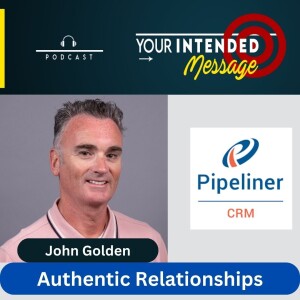
Thursday Aug 15, 2024
How to be authentic with your marketing and sales: John Golden
Thursday Aug 15, 2024
Thursday Aug 15, 2024
Authenticity in your marketing and sales conversations
How you can excel when the bar is set so low
Episode 220 (John is based in California)
In this conversation with John Golden we explore:
- How to start an authentic relationship with your prospects
- How to research before the first contact
- How to create intellectual curiosity
- How much research do you need - not much
- How to leverage your customer success stories
- Present your vulnerability to build trust
- Staying in touch with your customers
- How to establish your communication cadence
- Where does automation ad AI fit into relationships
- The critical role of active listening
- Why lean on your CRM
-----
About our guest, John Golden:
John is Chief Marketing & Strategy Officer at Pipeliner CRM.
He is an author, speaker and host of Sales POP! podcast,
You can learn more about Pipeliner CRM and take the free trial at:
https://www.pipelinersales.com/
-----
Excerpts from this conversation with John Golden:
I think there's a few things, George, and one of them, I think, is, is authenticity. I think that is one of the biggest areas that you can focus on now.
-----
Oh, customer success stories, 100% and I think this is where sometimes we forget. It seems so obvious, right? But when I engage personally, when. I engage with another salesperson, right? Or somebody selling something to me?
Yes, you know, I'm interested in what they can do for me, what I'm really interested in what they've done for other people, because that's where it is.
Because, let's face it, we all know that anybody who's brought a product or service to market, you always know that customers end up using it in ways that you could never imagine, right?
And they do things differently, not how you see and therefore learning about what you have done with other people, that is great information for for somebody, for prospect you're engaging with, and that's what I love. I want to hear the things that they've done with other people, how they helped other companies, how they helped other individuals.
And those stories and and we all come from, I mean, culturally, we all kind of come from storytelling traditions, you know, certainly I did, you know, in Ireland, and that's what resonates with people, is stories.
And now you take yourself out of the equation a little bit, and you put, you put your customer, and you say, You know what their issue, what their solution? And then, and here's the nice thing, is, like, you should be enthusiastic and say, and then they did this, or they asked us to do this, right?
They said, hey, if your product could just do this one other thing, and, you know, something, we went back and we discovered, yeah, that's something that would benefit everybody. And then we immediately, you know, implemented it in a way.
So this, there's so much richness in talking about your customer success story.
-----
Read the rest of this entry »
Thursday Aug 08, 2024
Listen because you'll miss the point: Julian Treasure
Thursday Aug 08, 2024
Thursday Aug 08, 2024
Listening is a skill that can and must be learned to be more successful
Episode 219 (Julian is based in the Orkney, off the North Coast of Scotland)
In this conversation with Julian Treasure we explore:
- How listening helped our survival for thousands of years
- Why listening seems so difficult and is ignored
- The difference between hearing and listening
- Why we seem to focus more on speaking instead of listening
- Listening as a skill that needs to be learned and developed
- The inverse relationship between emotion and listening
- How to have respectful conversations with people who disagree with
- Why is listening more difficult the more senior you become in an organization
- Why diversity of perspective and opinion is valuable
-----
About our guest Julian Treasure:
Julian Treasure is an author and international speaker on sound and communication skills. His five TED talks have been viewed over 150 million times and his book “How To Be Heard” won both Audie and SOVAS awards for best business audiobook. His company The Sound Agency has been helping major global brands to improve their sound since 2003.
Learn more about Julian and his programs at
https://www.juliantreasure.com/
Books by Julian Treasure
https://www.juliantreasure.com/books
https://www.juliantreasure.com/books
-----
Excerpts from this conversation with Julian Treasure:
Most people don't even understand that listening is different from hearing. Hearing is a capability. Listening is a skill. It's a skill you can practice and master, and if you do that, you can gain huge advantages in your life. Because the sad truth is, most people don't listen.
-----
To me, listening is the foundational skill of all of our communication. It's primal, it's critical, and yet we seem to have forgotten about it.
We don't teach it in school, which is mad when you think about it, because if you taught children first how to listen really well, how much more of their education would they absorb and retain than they do now.
Where they're struggling in classrooms built by architects who don't listen, the children can't hear very much a great deal of the time. And if they can hear it, are they actually listening? Not really, because they don't know how to do that.
-----
The foundation of my work really is that these skills, speaking and listening, have profound effects on three very important things, our happiness, our effectiveness and our well being.
So dear listener, if you don't care about any of those three things, don't bother.
But if those things are important to you, and I rather suspect they are, it really is worth opening these doors to whole new worlds of capability, skill, and, you know, transformed outcomes in those three domains, your happiness, your happiness, your effectiveness and your well, being powerfully affected by how will you speak and how will you listen?
-----
Read the rest of this entry »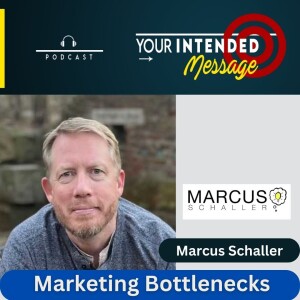
Thursday Aug 01, 2024
Clear the Marketing Bottlenecks: Marcus Schaller
Thursday Aug 01, 2024
Thursday Aug 01, 2024
Target your marketing specific to one person
Episode 218 (Marcus is based in Ohio)
In this conversation with Marcus Schaller we explore:
- How bottlenecks vary from small to large companies
- The reality of limited time, energy and money
- The misunderstanding of how to scale
- Measuring the wrong parameters on social media
- Clarifying the ideal customer
- How customer service can align with your marketing messages
- How compensation criteria contributes to internal conflicts
-----
About our guest, Marcus Schaller:
Marcus has over 20 years experience as a marketing strategist, coach and copywriter.
His experience includes creating messaging strategies and campaigns for several industries, including B2B, technology and SaaS.
Learn more about Marcus and the marketing services he offers
-----
Excerpts from this conversation with Marcus Schaller:
How does one decide which way to go? And how many directions should we be going in?
Oh, another really good question, George. Again, dependent on situation, I think the mistake is what not to do is to constantly "Chase every new shiny object".
Now, I think in terms of smaller businesses, that tends to be where my head's at, that's the clients that I tend to work with as a coach. So it's like I'm thinking in terms of your one, or one or two people, or maybe even five or six, it's a small team, you only have so much, again, resources, time, energy money.
The other thing to think about too, is that not only does it spread out too thin trying to do everything, which is just a it's a physics, it's a math equation at that point.
If you think about as a solopreneur, or as an entrepreneur, with a small team, there are certain things that you have certain talents.
You have a background in radio, it makes perfect sense that you would do a podcast, it would be ridiculous for you not to right now.
Would it make sense for you to do something that let's say TicTok and I'm not sure if you're on. But let's say you don't really like being on social media, you don't like TikTok? You don't enjoy? You don't consume it, you don't scroll through it every day.
Does that make sense to us? Probably not. So I think it really starts with the person running the business, if it's a small business, and even with a larger company, do you have the staff? Do you have the team to be able to support multiple, they're going off into multiple directions. And it's kind of that classic problem where there's no actual focus, and they're not really getting any impact? And then of course, you have to integrate that with like, where's your audience?
So if it turns out that you find out that, let's say you personally don't like using YouTube, I know that's not true. But let's say you don't like YouTube, but you find out that that's where the majority of your potential is. You might have to just figure it out.
But I think it really starts with go with your strengths, because there's certain things that we're just good at, and why wouldn't we leverage that as much as possible?
-----
Your brand is not really up to you, we can design what we want our brand to convey. Again, your intended message of your brand, can be something we sit down and we design and this is our intention of what we want to communicate, but ultimately the brand is how your audience and how your customer base sees your company.
-----
Read the rest of this entry »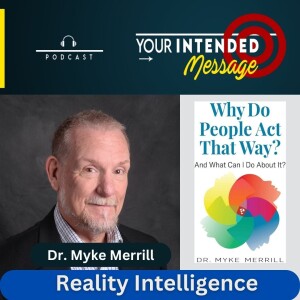
Thursday Jul 25, 2024
When is rage good? Myke Merrill
Thursday Jul 25, 2024
Thursday Jul 25, 2024
You can't do everything but you can do something
Episode 217 (Myke is based in New York state)
In this conversation with Dr. Myke Merril we explore:
- How do we perceive reality
- What does it mean to be emotional?
- The power of saying, "Tell me more about that"
- Emotions are not good nor bad, it's what you do with it
- How can anger be constructive
- How to change a reaction to a response
- Four words to eliminate from your speaking
About our guest:
He has written 28 books to make his wealth of knowledge and insights widely available.
Dr. Mike has two mottos of life. One, be constantly curious, learn something about everything, frequently use the expression, tell me more.
And to I cannot do everything, but I can do something. So I will do that.
Learn more about his book and services
https://whydopeopleactthatway.com/
-----
Excerpts from this conversation with Dr. Myke Merrill:
Tell us a little bit about what is this thing that we call reality?
That is a tremendous philosophical question. But it's also a biological question. How a person how every human being perceives the reality in which they are personally immersed, there isn't a reality of what's happening and some star somewhere 400 light years away.
The reality is, that's not a part of our reality. But when I'm driving along, and somebody cuts me off, that is part of my reality. And the question then is, how do I perceive that moment? Is that an aggressive moment? Or do I have compassion in that moment? Is it somebody who just wet their pants and are trying to get to a bathroom really badly? And they're not thinking about anything else?
Or did they just get fired from work? And they're pretty much at the end of their rope. I mean, I don't know what's going on. But my reality is the journey I'm on.
-----
But a starting point is it's either a reaction or a response. A reaction is unplanned, spontaneous, and usually less or uncontrolled. A response is reasonable, mature, experienced, and and has a plan. They're both emotional. They're both emotion, emotion is both sides.
But if you have a reaction, can you shift that to a response? Can you say, I know I just gave you the finger because you pulled in front of me. Let me back that up just a little bit.
Because I'd like to take a different course here, or you're in an argument with your your management team and your business. And some new startup comes in with some wild idea. And you immediately trashed the person, not the idea. And to be able to that was my reaction, and to be able to say, I just reacted there, and I don't want to do that. Let me pull that back.
And let me respond, not react. Both of those are emotional, both are intense. loads, it really matters what we're talking about here. But I'm going to respond instead of react. So emotion for me became either the reaction or the response, linking my perceptions to my motivations, and their interactive.
-----
Read the rest of this entry »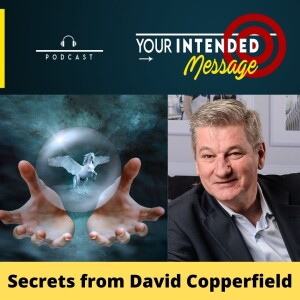
Thursday Jul 18, 2024
12 Secrets from David Copperfield
Thursday Jul 18, 2024
Thursday Jul 18, 2024
12 Secrets from David Copperfield to help your Business
In this episode, your host, George Torok reveals these secrets that he learned while assisting David Copperfield on stage at the MGM Grand in Las Vegas.
George Torok helps executives deliver their high value presentation more effectively. Naturally he studies other presenters and performers to learn from their techniques and styles.
He observed David Copperfield up close and uncovered these gems in his performance that apply to business communication.
-----
Excerpts from this podcast
David Copperfield - live at the MGM Grand Hotel Las Vegas! You might be fascinated to know what I discovered behind the curtain. I was lucky enough to assist him with one segment of his show. Of course I was sworn to secrecy and cannot reveal the magic behind that trick.
Watching a master at work inspired me to do more than just watch - to observe and learn. I can reveal to you the secrets of David Copperfield that you can apply to your business.
What are those 12 Secrets?
There is no magic
Illusion is more powerful than reality
People believe what they want
The audience is always right
Preparation is everything
Prepare for the unexpected
Believe in people
Offer them hope
Make it fun
Be vulnerable
Don't be seduced by technology
You don't need a cape.
-----
Read the rest of this entry »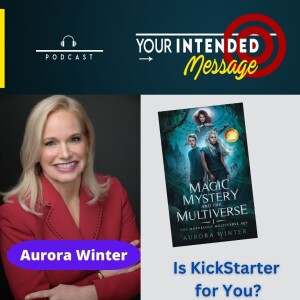
Thursday Jul 11, 2024
Product Launch with KickStarter: Aurora Winter
Thursday Jul 11, 2024
Thursday Jul 11, 2024
10 Lessons to launch your product on KickStarter
Episode 215 (Aurora is based in Vancouver, Canada)
In this conversation with Aurora Winter we we explore:
- Why is Kickstarter a good place to launch your new product?
- The nature and importance of the KickStarter community
- What are the benefits to those who pledge their support?
- What types of creative products can be launched?
- The appeal of being part of a community of creators
- Raising money is only part of the benefit to creators
- How else can authors make money?
- Appreciating the love of reading.
About our guest and offer:
To participate in the book launch, visit this site before July 16, 20224
https://magicmysteryandthemultiverse.com/
After this date, you can still visit this url for the latest on this series of fantasy books from Aurora Winter.
-----
Excerpts from this conversation with Aurora Winter:
The quick summary on Kickstarter is that it is it is a crowd funding platform that is specifically oriented for supporting the creation of new products.
So that would include books, but it also could include a backpack or a watch or a new kind of jacket or glasses, and or jewelry. So many creators have fun or even a film, many creators have funded their project on Kickstarter.
Kickstarter is distinct from other crowdfunding platforms. It's not like a GoFundMe, it's not please, please, please, I need money, it's more, I have this exciting idea. It's so wonderful. And I would really like to give you the opportunity exclusively to get this hot off the press before it's available to the general public.
And usually, you will also get something different and distinct from what is available for the general public.
So people who like first editions, people who want signed editions or they want something collectors, Kickstarter is really great for that. And one more thing I learned about Kickstarter, and I've a number of things to share.
But one other thing that people might like to know is Kickstarter is your first stop, it doesn't take away from selling your product on Amazon or wherever you might sell it. But if you go to Kickstarter, first, you offer that exclusive window, and you don't have to ship the following day.
So you can use the funds to create your movie, or to finish, you know, your design of the book cover. In my case, my book is already done. So that wasn't the case.
But Kickstarter does give you the opportunity for a little window of time to finish your creative project. Like my son did a video game on Kickstarter.
So it's something and it's something that's, I think, really exciting and fun, because you get to meet the creators.
-----
Read the rest of this entry »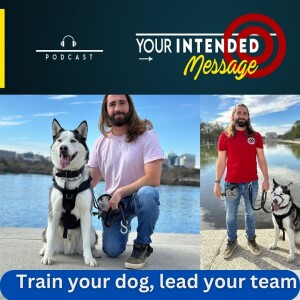
Thursday Jul 04, 2024
Leadership Secrets from Dog Training: Brady Foulk
Thursday Jul 04, 2024
Thursday Jul 04, 2024
Leadership lessons from dog training
How can you lead your team like training a dog
Episode 214 (Brady is based in Austin, Texas)
In this conversation with Brady Foulk we explore:
- What dog training has in common with leadership skills
- How to understand their world - the dog or your team
- Connect and build new patterns of behavior
- The importance of along time
- How to allow a safe place to cool off
- Pavlov's lessons of classical conditioning still applies to people and dogs
- How to associate desired behaviors with rewards
- The freeze, flight or fight response
- The misuse of anger and punishment in training
About our guest, Brady Foulk:
A passionate and knowledgeable dog trainer whose expertise transcends conventional boundaries.
With a rich tapestry of experience and certifications in Dog training, Lifestyle Coaching, NLP (Neuro-Linguistic Programming), and ABA therapy. Brady, at 29, has dedicated the last 6 years of his life to crafting the perfect canine companions.
Whether it's honing the skills of service dogs or instilling a sense of calm and security in emotional support animals, Brady's holistic approach resonates deeply with every furry friend and their loving owners, fostering a harmonious and enriching bond.
-----
Join the dog training community.
https://www.newdirectiondogtraining.com/free-community1
-----
It's not about giving your people dog treats. It's more about understanding their perspective and seeking to direct their behavior.
-----
And I want your audience to know if you have a dog, you're in the right place. We're going to talk about some dog training tips and tricks, I got lots to share.
And yeah, if you don't have a dog, I want you to know, you're also in the right place. We're gonna talk about effective, elegant leadership, we're gonna talk about how it applies to your business and how it applies to your life.
-----
And so let's address the issue of punishment. Yeah. When does punishment fit and what are relevant punishments do we do we take a rolled up newspaper and hit the dog on the nose?
Yeah, I don't believe in physical punishments. I feel like there's we've evolved to a point where we can communicate more effectively. It's like it's not appropriate for me to hit you. If I get mad at you. I have to figure out how to communicate to you to work with you. And most of the time, you probably don't feel heard.
-----
Read the rest of this entry »